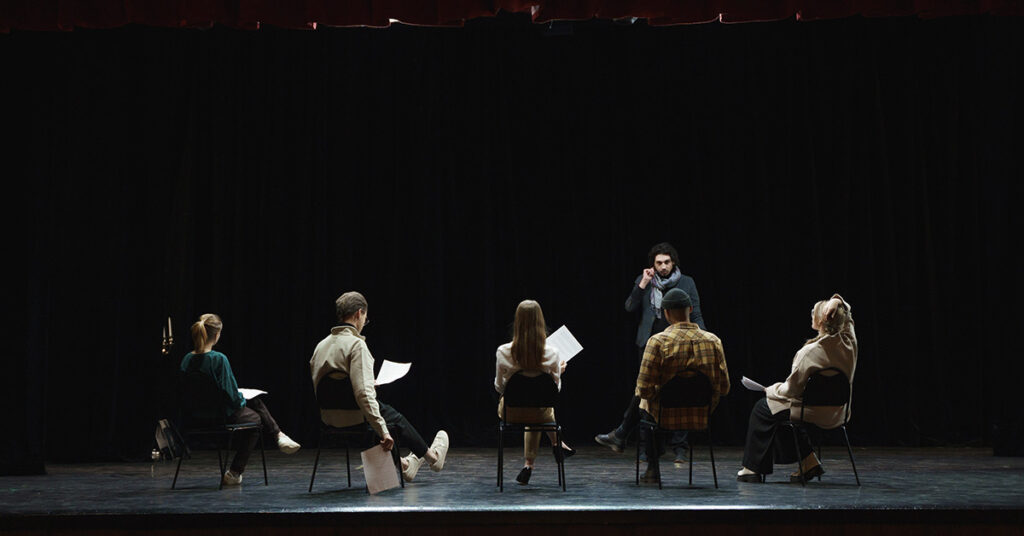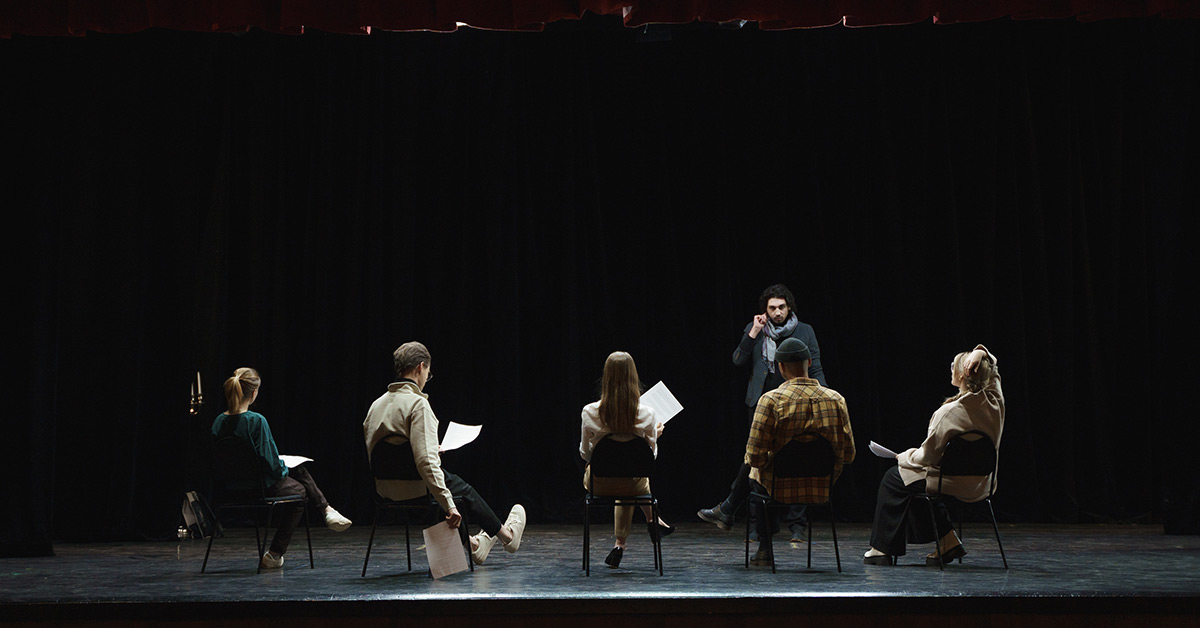What We Can Learn from Improv for Constructive Dialogue in Affirmation


by Joel McDonald
I was an actor in plays and musicals in middle school and high school. I continued the hobby as a community theatre actor for a time. It’s been a while since I’ve been on stage, but I’m still a fan of the art. Maybe one day I’ll get back on stage. Who knows.
In theatre, you learn to think quickly on your feet to respond to things going not quite according to the script. For example, once I was in a murder mystery situated in a mansion in upstate New York in the middle of a snowstorm that lost power. While the dimly lit set and candles and flashlights used helped with the suspense of the show, the power coming back on at the right time at the end of the show was also important. During one performance, the power did not come back on. The batteries powering the radio used by the light booth operators to hear cues had died. As our director made their way to the booth, I and my fellow actors gathered together, joined hands, and prayed for the power to return. Unscripted. Once the power did return, we were able to continue as rehearsed. That’s improvisation. It’s a necessary skill in theatre. Things go awry much more often than audiences ever realize.
Even though I learned to improvise in theatre, I’ve never had any desire to be an “improv” actor. Improv is a form of comedic theatre where there are no scripts. Everything is made up in the moment. Sometimes the audience is asked to suggest situations or story elements that the actors would then use to put on their show or skit. I don’t think it’s something I’d be very good at. My brain doesn’t work that way. I need some type of structure. I like scripts. However, one of the basic lessons any improv actor learns is, “Yes, and…” Improv actors must accept whatever happens or is said and then build upon it to keep the show running. Without this, there’s no story created. There is no show.
Central to Affirmation’s mission and vision we are worldwide communities of refuge for LGBTQIA+ current and former Latter-day Saints and their families and friends to share their stories. Spaces where we can connect, share, and realize that we are not alone. Anyone along the spectrums of sexual orientation, gender identity and expression, faith, and relationship with The Church of Jesus Christ of Latter-day Saints should be able to find a place in the communities Affirmation creates or find individuals within these communities who have walked or are walking similar paths as they are. For those who listen, the challenges, doubts, faith, anger, joy, and love we share with one another should help us increase our understanding of each other and even ourselves. So often I’ve listened to or read someone’s story and have seen myself in their shoes or have heard something I had long felt internally expressed by someone else in words that I’ve been unable to assemble.
One of Affirmation’s greatest challenges and yet greatest strength is that we’re attempting to create communities inclusive of all LGBTQIA+ Latter-day Saints and our allies. Whether you continue to have a testimony of the Church or have long determined that you no longer believe in its claims, you’re welcome in Affirmation. Your experiences and beliefs are valid. Your story is important and valuable. Your authentic participation in Affirmation can help someone to better understand you, those like you, and themselves.
Today, so much of our interaction with each other in Affirmation is online, and this has been especially true over the last year as all Affirmation events have been virtual due to COVID-19. Online dialogue is challenging. Online dialogue between individuals with differing beliefs is a greater challenge. Online dialogue between individuals with different beliefs with similar backgrounds, surprisingly, can be an even greater challenge.
While in-person dialogue includes visual and verbal cues to communicate tone, those cues aren’t available in the posts we make on social media, the emails we write, or the text messages we send. When another person reads what we’ve posted or sent, they fill in these blanks with their imagination to determine the tone of your message. Unfortunately, our imaginations tend to fill in these blanks negatively. Even the best-crafted messages can fall victim to the reader assuming the worst in the intentions of the author. This can easily happen even when the author and reader are in agreement about an issue. It’s near-certain to happen when they disagree.
All of us within the Affirmation share the experience of having been or continuing to be at the intersection of being LGBTQIA+ and being a Latter-day Saint. For most of us, this experience introduced significant challenges and even trauma into our lives. This is why Affirmation seeks to be a refuge for us and a place to land in the midst of those challenges and trauma. Affirmation also promotes the self-determination of individuals as they confront those challenges and move beyond that trauma. This is a process. It takes time. All of us are in different places on that journey.
Our shared experience in the Church may also play a role in how we respond to experiences or beliefs that don’t align with our own. Often Latter-day Saints approach their faith as all-or-nothing. The Book of Mormon is true therefore Joseph Smith was a Prophet and therefore the Church is true. There is little room for nuance. It would be wishful thinking that LGBTQIA+ Latter-day Saints were exempt from this kind of thinking, whether they continue to have a belief in the Church or not.
These are serious challenges for constructive dialogue in Affirmation. If there’s not space where our experiences and beliefs can be shared authentically without judgment, then we will lack the benefits gained by the sharing of them. We’ll miss out on the opportunity to increase our understanding of each other and ourselves. However; while serious, I think we can overcome these challenges if we’re willing to assume the best intentions of others in our community, find the empathy needed to be compassionate toward others and their circumstances, and allow for the hearing or reading of experiences and beliefs that differ from our own without feeling the need to defend our place on our individual journeys.
We need to be able to accept the experiences and beliefs shared by others and, instead of feeling the need to counter them. We need to constructively build the dialogue among one another by learning from our Improv friends by saying, “Yes, and…” Doing this, we allow space for the experience, stories, and beliefs of others while also adding those of our own. We build upon one another’s contributions to this dialogue and we build a community of safety, love, and hope for where all can land, heal, share, and be authentic.
This article was submitted by an Affirmation community member. The opinions expressed are wholly those of the author and do not necessarily reflect the views of Affirmation, our leadership, or our staff. Affirmation welcomes the submission of articles by community members in accordance with our mission, which includes promoting the understanding, acceptance, and self-determination of individuals of diverse sexual orientations, gender identities and expressions, and our vision for Affirmation to be a refuge to land, heal, share, and be authentic.